Are you unsure about which vaccines are essential to keep your beloved feline friend healthy? In this article, we will provide you with a concise guide on the vaccinations your cat requires for a long and happy life. From core vaccines that protect against common diseases to optional vaccines for specific circumstances, you’ll find all the information you need to ensure your cat receives the necessary immunizations to stay strong and protected.
Core Vaccinations
Feline Panleukopenia (FPV)
Feline Panleukopenia (FPV), also known as feline distemper, is a highly contagious and potentially deadly viral disease that affects cats. This virus attacks the white blood cells, which are an essential part of the immune system. Vaccinating your cat against FPV is crucial to protect them from this dangerous illness. The vaccine is highly effective and recommended for all cats, regardless of their age or lifestyle.
Feline Calicivirus (FCV)
Feline Calicivirus (FCV) is a common respiratory virus that can cause a range of symptoms, including sneezing, coughing, nasal discharge, and ulcers in the mouth. While most cats recover from FCV with supportive care, severe cases can be life-threatening. Vaccinating your cat against FCV is important to minimize the risk of infection and reduce the severity of symptoms if they do contract the virus.
Feline Herpesvirus (FHV)
Feline Herpesvirus (FHV), also known as feline viral rhinotracheitis, is another common respiratory virus that affects cats. It causes symptoms similar to FCV, such as sneezing, nasal discharge, and ulcers in the mouth. Like FCV, FHV can lead to severe illness in some cats and can even be fatal. Vaccinating your cat against FHV is essential to prevent infection and reduce the severity of the disease.
Rabies
Rabies is a deadly viral infection that affects not only cats but also other animals, including humans. It is spread through the bite or scratch of an infected animal. Vaccinating your cat against rabies is not only important for their health but also for public safety. Many states and municipalities require cats to be vaccinated against rabies, and it is a legal requirement in many places. Rabies vaccines provide long-lasting protection and are typically given every one to three years, depending on local regulations.
Non-Core Vaccinations
Feline Leukemia Virus (FeLV)
Feline Leukemia Virus (FeLV) is a contagious and potentially fatal virus that attacks the immune system, making cats more susceptible to other infections and diseases. FeLV is typically spread through close contact with an infected cat, such as mutual grooming or sharing food bowls. Vaccinating your cat against FeLV is recommended, especially if they spend time outdoors or live with other cats.
Feline Immunodeficiency Virus (FIV)
Feline Immunodeficiency Virus (FIV) is similar to HIV in humans and weakens a cat’s immune system, leaving them vulnerable to various infections. FIV is primarily transmitted through bite wounds during fights between infected and uninfected cats. Vaccinating your cat against FIV is important if they have a high risk of exposure, such as outdoor cats or those that interact with other cats of unknown FIV status. However, it’s important to note that the FIV vaccine does not provide complete protection and is not routinely recommended for all cats.
Chlamydophila Felis
Chlamydophila Felis is a bacterial infection that affects the respiratory tract of cats. It can cause symptoms such as sneezing, nasal discharge, and eye infections. While not as common as some other respiratory viruses, the Chlamydophila Felis vaccine may be recommended by your veterinarian, especially if your cat is at a higher risk of exposure, such as living in a multi-cat household or frequenting areas with high cat populations.
Bordetella Bronchiseptica
Bordetella Bronchiseptica is another respiratory infection that can affect cats, particularly those that come into contact with other cats in environments like boarding facilities or shelters. The Bordetella vaccine can help protect your cat against this bacterial infection, reducing the risk of respiratory symptoms and complications.
Feline Infectious Peritonitis (FIP)
Feline Infectious Peritonitis (FIP) is a viral disease that primarily affects young cats. It is caused by a type of coronavirus and can lead to severe illness and even death. Unfortunately, there is currently no highly effective vaccine available for FIP. It is important to discuss the risks and benefits of vaccination with your veterinarian, as they can help determine if the FIP vaccine is appropriate for your cat based on their individual circumstances.
Vaccination Schedule
Kitten Vaccinations
Kitten vaccinations are crucial in providing early protection to young cats. They usually start as early as six to eight weeks of age, as kittens gradually lose the immunity they obtained from their mother’s milk. The initial vaccination series typically includes multiple doses of core vaccines, such as FPV, FCV, FHV, and rabies. These vaccines are given at specific intervals, usually three to four weeks apart, to ensure the kitten develops a strong immune response.
Booster Shots
After the initial vaccination series, cats require regular booster shots to maintain their immunity against various diseases. Booster shots are usually given annually or every three years, depending on the specific vaccine and local regulations. These booster shots reinforce the cat’s immune system, ensuring continued protection against diseases like FPV, FCV, FHV, and rabies. It is essential to follow the recommended booster shot schedule provided by your veterinarian to ensure your cat remains protected.
Adult Cat Vaccinations
Even as adults, cats still require regular vaccinations to maintain their immunity. Core vaccines should be administered to adult cats, with the frequency of booster shots determined by the vaccine type and local regulations. Non-core vaccines, such as FeLV, FIV, Chlamydophila Felis, and Bordetella, may also be recommended based on your cat’s lifestyle and risk of exposure. Your veterinarian can help determine the appropriate adult vaccination schedule for your cat, taking into account their individual needs.
Vaccination Side Effects
Common Side Effects
Vaccinations can, in rare instances, cause mild side effects in cats. These side effects typically include temporary mild fever, lethargy, and a decreased appetite. It is important to monitor your cat after vaccinations and contact your veterinarian if you notice any concerning symptoms. Most common side effects resolve on their own within a few days and do not require any specific treatment.
Rare Side Effects
While rare, more severe side effects can occur after vaccinations. These may include allergic reactions, such as facial swelling, difficulty breathing, or hives. Anaphylaxis, a severe allergic reaction, is an extremely rare but potentially life-threatening side effect. Other rare side effects may include vomiting, diarrhea, or injection site reactions. If you observe any unusual or severe symptoms after vaccinations, it is crucial to seek immediate veterinary care.
Vaccination Exemptions
Medical Exemptions
In some cases, certain medical conditions or allergies may make it unsafe or inappropriate for a cat to receive certain vaccinations. These medical exemptions are determined by a veterinarian who will assess the cat’s health and individual circumstances to determine the best course of action. If you believe your cat may have a medical exemption, consult with your veterinarian to discuss the risks and benefits of vaccination in light of your cat’s specific health condition.
Age Exemptions
Young kittens and elderly cats may have age-related exemptions from certain vaccinations. For kittens, the initial vaccination series protects them against core diseases, but they may not receive non-core vaccines until they are older. Similarly, elderly cats may have a reduced immune response, and certain vaccines may not be as effective or may carry a higher risk in older cats. Your veterinarian can guide you on appropriate vaccination options based on your cat’s age and overall health.
Consulting a Veterinarian
When it comes to your cat’s vaccinations, consulting a veterinarian is crucial. They have the knowledge and expertise to develop an individualized vaccination plan based on your cat’s needs, lifestyle, and risk factors. Furthermore, they can provide guidance on the proper timing of vaccinations, potential exemptions, and address any concerns or questions you may have. Regular check-ups with your veterinarian are also essential to ensure your cat’s overall health and to update their vaccinations as needed.
Conclusion
Vaccinating your cat is an essential part of responsible pet ownership. Core vaccinations such as FPV, FCV, FHV, and rabies protect cats against serious diseases that can be life-threatening. Non-core vaccines like FeLV, FIV, Chlamydophila Felis, Bordetella, and FIP may be recommended based on your cat’s lifestyle and risk of exposure. Following a proper vaccination schedule, monitoring for any potential side effects, and consulting with a veterinarian are key to protecting your cat’s health and ensuring they live a long and happy life.


